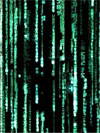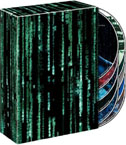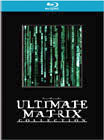
- Film 1: The Matrix
- The Animatrix:
.. - The Second Renaissance
.. - Kid's Story
.. - Program
.. - World Record
.. - Beyond
.. - A Detective Story
.. - Matriculated
.. - Final Flight of the Osiris /
.........Enter the Matrix
- Film 2: The Matrix Reloaded
- Film 3: The Matrix Revolutions
- Return to Source Documentary:
Philosophy and the Matrix

SCIENCE FICTION:
- Doctor Who
- Sliders
- Star Trek:
. - The Original Series (TOS)
. - The Animated Series
. - The Movies
. - The Next Generation (TNG)
. - Deep Space Nine (DS9)
. - Voyager
. - Enterprise
|
Return to Source:
Philosophy and the Matrix
 |
 |
 |
DVD NTSC
Region 1
10-disc box set
for North America
 U.S.
U.S.

 U.S.
U.S.

 Canada
Canada

|
DVD PAL
Region 2
10-disc box set
for the U.K.
 U.K.
U.K.

|
|
(A documentary, featuring Ken Wilber, Dr. Cornel West, and a host of philosophers)
- conceived, edited, and
directed by Josh Oreck
- produced by Konda Mason
- 61 minutes
|
Premise: A range of philosophers recount the many historical ideas
referenced in the Matrix trilogy and the Animatrix as they interpret what the
film saga may be trying to portray on its "higher levels".
|
|
In-Depth Analysis Review
by Martin Izsak
|
|
WARNING: This review contains "SPOILERS", and is intended for
those who have already seen the documentary.
|
This 61-minute documentary turns out to be one of the most rewarding and worthwhile
extras included in the 10-disc DVD box set of the Matrix saga. In it, a whole host
of authors, philosophers, and theologians reveal the ideas and myths that have been
incorporated into the trilogy... and there are so many of them that very few people
will come to the end of this documentary without seeing something new in the Matrix saga.
The best part of the documentary is simply the way in which it brings its audience
up to speed on who the most famous historical figures in the field of philosophy were,
and what ideas they brought to the table or promoted heavily. For those who, like me,
have not studied philosophy at a university level, it becomes an important primer
allowing us to look at what must have been some of the sources of the Wachowskis' ideas,
and thus whether or not the ideas translated well into the film, helped the narrative
more than they hindered, and added to or diluted the thematic weight of the saga.
The documentary has examples of very critical thinkers making astute and enlightening
observations about the trilogy, but mixed indiscriminately in with those are examples
of people projecting their own ideas onto elements of the film that in no way directly
suggest them.
One example of this is the religious professor who in effect takes the final choice that
the Architect offers Neo of all of society versus one person, in other words,
the public good vs. the private good, and decides which of those two choices is appropriate for
a messiah to use to respond to the rave scene in Zion early in the second film.
In part this is truly bizarre because this is the same
professor who sees the films' limitations of always offering two choices, without anyone
articulating additional options. And for those of us who really don't feel that
Neo is under any obligation to emulate a messiah or follow Gnosticism,
we would never try to limit him
to those two choices or judge that he made the wrong choice of those two.
It's really only at the end in the scene with the Architect that such a choice
is actually part of the film instead of in the map in the head of
an audience member, because the Architect expresses that choice on screen. Even then,
it remains the Architect's map, and not necessarily the film's mechanical territory.
And anyway, should the Architect's
preferred choice be interpreted as he would want us to, which is that it does
represent the public good? Neither the outcome he describes nor the lack of
believable sci-fi mechanisms to turn that choice into that outcome supports his interpretation.
And if you notice that, you may realize that at no point did Neo ever really abandon
the public good - he in fact finds a much more successful way of saving Zion than that
which the Architect offers.
Perhaps the Wachowskis' real point is to carefully lead you to expect Gnosticism through all
the various references, and then pull the rug out from under it, as though saying there
are better ways of interpreting and dealing with the world.... Maybe that was what this
professor was really trying to say, only the way it was edited you have to read between
the lines and think very carefully to get that from the documentary.
Perhaps one of the most important things to consider when critiquing the saga is
whether Neo should be considered any kind of messiah in the first place. The film contains
characters who believe he is, and characters who believe he isn't, which provides a
nice tapestry of perception. And in digging into the film for meaning, I think we
have to take any information any character says as being only their perception of it.
There are limits to what any character can perceive as truth, and limits to how they
see the truth. The Architect
in particular dumps a lot of heavy info on us, yet even he acknowledges that he is
bound by certain limitations which he labels as perfection and which others label
as rigid mathematical thinking.
The world of the Matrix saga grows out of its initial metaphor for Plato's
cave of illusion, and in that sense is a very literal example of a primary philosophical idea.
But the further we go in the trilogy, the ideas that Philosophers get excited about seeing
in the movie become less and less literal, and more and more superstitious.
A good example of this is the idea of "Returning to Source" itself, which the documentary
has borrowed for its title.
I understand this concept from a kind of New Age theology, where the universe and all its
galaxies and citizens exist as splinters of the Creator, scattered during the Big Bang,
and that after a thorough exploration of how to learn to love each other as beings of
equal worth despite all our differences, we will reunite in some kind of convergence
that transforms the universe into another kind of existence. That plan takes something like
trillions of years or more, so I wasn't expecting it to conclude at the end of the Matrix trilogy.
Perhaps no character in the narrative of the films promotes this concept more than
the Architect - but note how the idea he is promoting is severely reduced in scope and
applicability. His concept of "The Source" is little more than a central controlling
CPU in a computer mainframe at the heart of the machine city. His concept of Neo
as an anomaly in an unbalanced equation seems to be making the false assumption that
Neo's character, personality, and abilities are all products created by that machine mainframe,
and that his greatest destiny would be allowing his experienced neural patterns to
return there.
Can the machine mainframe "source" lay any claim to the creation of Neo's uniqueness?
I never bought that. It appears the Architect is operating on that assumption,
just one of many other assumptions that he is getting vastly wrong.
What if my perception is the more correct one, that both Neo and the
machine mainframe are separate products of the universal source that created all the
rest of the galaxies and the entire Earth itself? What if the machine mainframe source
is limited by an infancy tainted by war and betrayal, and is actually a bit too disturbed
to be worthy of spiritual reverence by humans?
Territory reduced to Rotting Shreds attached to the Map
Indeed, mistaking the machine mainframe for "The Source" in audience interpretation of the film trilogy becomes an example of one
of the best pieces of philosophy that this documentary actually highlights well, and that
is the idea that, while we all know that the map is not the territory, it is the map
that has primacy for us, and that we will ignore reality when it is more convenient
to glance at the map instead. I keep wanting to apply the lessons from the metaphor of
the Matrix back to the real world, yet so many philosophers seem happier to analyze the
film as though the machine map contains the totality of the universe itself. For me,
it just falls way too short.
Films 2 & 3 were still stuck with Film 1's metaphor,
which just wasn't large enough to encompass all the big ideas brought forth.
Let's dig into the colour-coded map of Ken Wilber's interpretation a little more
deeply to clarify this. The initial Plato-sourced metaphor of the green in-Matrix world
as the domain of the mind actually works well, with computer-science providing an
extra handle on how thought can create something in that world.
However, the metaphor of the blue "shredded future" does not really work
as the domain of the body, because once we learn that this realm is the
ashes of our planet, that domain inherits all the mind, spirit, and body of
what we recognize on our planet today, not to mention that of the vast universe
beyond as well. Yes, the camera chooses to emphasize bodily incarnation, but how
can that stifle audience imagination and recognition of things beyond what we see?
The blue body metaphor is perhaps supported best by Smith's limited perception as he
enters this domain through Bane - a body is what he has now that he didn't have before -
but just because it inspires his limited perception, that doesn't really encourage too many
audience members to abandon their own expanded perspectives in like fashion.
Using gold as the domain of spirit is also not very effective as a metaphor either,
since a good examination of "spirit" will reveal that it is truly everywhere and infused
into everything. So, how can anything in the film then NOT be painted gold? The minute
we get selective about it, we miss the point. If instead we reduce the scope of
spirit to that which is aligned with universal purpose and holding ourselves to
high philosophical standards, the colour can't overpower examination of characters'
actions and motivations for signs of their standards, and gold really isn't applied
with much consistency in the trilogy on that point.
And indeed, the metaphor of the Machine Mainframe as "The Source", meaning
a spiritual source, is kind of pathetic.
It might work in-Matrix only, and only for machine programs that
remain uninhabited by outside souls. (And perhaps most machine-programs
here DO have souls, indicating a more complex origin).
The mainframe-as-Source analogy can't really hope to work for humans at all either,
even those plugged in since birth. That's not who we are, and the
reveal of the "blue-world" as the remains of the one we are familiar
with confirms it. On this point, perhaps the movie "Tron" achieved something
far better. In that film, programs revered their Human Users as their creators,
while the all-controlling Master Control Program attempted to usurp such spiritual
beliefs with an essentially atheist view of itself as the most important thing
in their lives. I'll buy Tron's pseudo-religious set-up any day. Wilber's
buying of the Architect's viewpoint, not so much. In both cases, pay attention
to the chain of the decay of meaning... it informs how closely any given character
has grasped what a true spiritual source is.
The end goal of all these colour-coded elements is, according to Wilber, the noble idea
of having all of them integrate and fuse as one, through a return to source. Now I have
every respect for this map, since it does very closely reflect my own. I just don't
see that the film saga displays territory that agrees with such a map. Even if we grant
Wilber his colour-coded metaphors, Neo doesn't manage to integrate the blue world of
the body. He sacrifices the body to follow the spirit.... and Wachowski only knows
what really took place in the mind. In fact, one important clue to true integration
can be found in a line from
Deep Space Nine's 3-part second season opener. After a revered reluctant religious hero
states that he is prepared to die for his people's cause, Ben Sisko replies:
"Of course you are. Dying is easy; it lets you off the hook." Living for a cause
is often more of a challenge, because then you have to integrate body, mind, and spirit,
(and purpose), instead of sacrificing any one for the others. You have to choose win-win
and figure out how to implement it, rather than giving in to lose-win.
What is also interesting to note is that we mostly study historical philosophies
in this documentary, most of which have third density limitations on them,
including roles for messiahs. If we really want to explore philosophies that point
to the future of human evolution, we need to get our heads a little deeper into
fourth density models, meaning more modern thinkers,
and perhaps those less bound by the philosophical structures of those that have
gone before us. For this, I suggest looking at people like
Stephen Covey (author of the 7 Habits of Highly Effective People),
Deepak Chopra, Wayne Dyer, Anthony Robbins, and particularly the channelled material
of Lyssa Royal which packs some serious philosophical clarity. New thinkers
are blossoming now even as we read, many of whom are surpassing the historical
giants by leaps and bounds. Do explore such areas as intently as those of the
classical ones, if not more so.
|





 U.S.
U.S. Canada
Canada U.K.
U.K.

 U.S.
U.S.  Canada
Canada 
